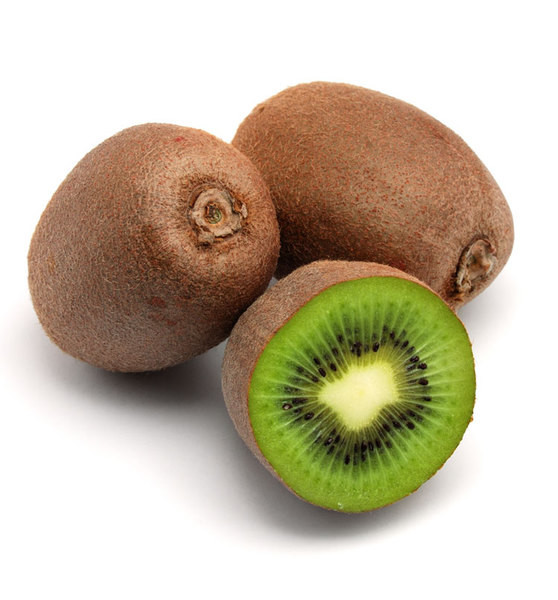 Kiwi benefits and harmNo wonder: Kiwi is just a berry, with small crunchy bones, juicy green flesh and an exotically unique taste, reminiscent of strawberries, strawberries, banana and watermelon at the same time. Kiwi is a very young fruit from China. He won his world fame thanks to a New Zealand amateur gardener Alexander Allison, who in the early 20th century brought to his homeland from China a decorative mihuato liana. And he became interested in far from small, tough and almost tasteless berries (only 30 g in weight!), But with its stunning white flowers, which at that time adorned the attic of many eastern houses. Who would have thought that some 30 years of courtship and cultivation would turn a Chinese liana into a prolific shrub with giant juicy berries (almost 100 g each!), Which, in addition to its excellent taste, also have a million useful properties. The fruit, which in the 70s scared the customs officers of different countries by its appearance and similarity to a grenade, can really be called a vitamin “bomb”. And above all, it concerns vitamin C, which in such quantities as in kiwi fruit is no longer in any fruit! Eating a hairy fetus a day, you provide your body with a daily rate (which is more than 250 milligrams) of vitamin C, which is so necessary for us in early spring to maintain the immune system, strengthen blood vessels, improve vision, increase the body's resistance to various infections, stimulate performance and even as an aid in coping with stress! In addition to vitamin C, kiwi is also rich in vitamins A and D, C, E, B2, B3, B6, beta-carotene, folic acid. Due to the content of magnesium, mineral salts (potassium), fiber, the fruit is able to help the heart, and digestion, and even the removal of excess cholesterol from the body: it burns fats that block arteries, which prevents the formation of blood clots (just like aspirin does) . Norwegian scientists have discovered this ability of the fruit and advised to eat 2-3 fruits a day to reduce the level of harmful fatty acids in the blood.
Kiwi benefits and harmNo wonder: Kiwi is just a berry, with small crunchy bones, juicy green flesh and an exotically unique taste, reminiscent of strawberries, strawberries, banana and watermelon at the same time. Kiwi is a very young fruit from China. He won his world fame thanks to a New Zealand amateur gardener Alexander Allison, who in the early 20th century brought to his homeland from China a decorative mihuato liana. And he became interested in far from small, tough and almost tasteless berries (only 30 g in weight!), But with its stunning white flowers, which at that time adorned the attic of many eastern houses. Who would have thought that some 30 years of courtship and cultivation would turn a Chinese liana into a prolific shrub with giant juicy berries (almost 100 g each!), Which, in addition to its excellent taste, also have a million useful properties. The fruit, which in the 70s scared the customs officers of different countries by its appearance and similarity to a grenade, can really be called a vitamin “bomb”. And above all, it concerns vitamin C, which in such quantities as in kiwi fruit is no longer in any fruit! Eating a hairy fetus a day, you provide your body with a daily rate (which is more than 250 milligrams) of vitamin C, which is so necessary for us in early spring to maintain the immune system, strengthen blood vessels, improve vision, increase the body's resistance to various infections, stimulate performance and even as an aid in coping with stress! In addition to vitamin C, kiwi is also rich in vitamins A and D, C, E, B2, B3, B6, beta-carotene, folic acid. Due to the content of magnesium, mineral salts (potassium), fiber, the fruit is able to help the heart, and digestion, and even the removal of excess cholesterol from the body: it burns fats that block arteries, which prevents the formation of blood clots (just like aspirin does) . Norwegian scientists have discovered this ability of the fruit and advised to eat 2-3 fruits a day to reduce the level of harmful fatty acids in the blood.

Making Money with Desserts: Success Stories
Yevhen Polishchuk (Fedutinov) instagram: @ evgeniyafedutinovavk.com / janeshomebaking– It all started with baking for relatives and friends. Gradually, she began uploading photos of her baking to Instagram, and orders began to come in. I made my first cake to order on October 13, 2014, and a little earlier I started making macarons and cupcakes. We can say that the business "found me myself", I am very [...]

Soups are cold recipes with photos
Cold cucumber soup with yogurt and lemonSorbet from La Taverna restaurant chef Alexander Zhurkina Photo: Getty Images Ingredients: Yoghurt without additives - 125 gCucumber - 150 gSorbet lemon / lime - 50 gCool shrimp - 24 gFresh ginger - 1 gLime lime - 5 gFresh orange juice - 5 gPetroshka - 1 g pink - 1 gCress salad - […]

barbeque kebab
Pork tenderloin glaze Photos: Dmitry Bayrak / dbstudio Cooking time: 20 minutes + time for pickling. Calorie content: 454 kcal per 1 serving. For 4 servings: 4 pork tenderloin (about 300 g each), 1 onion, 2 cloves of garlic, 1 tsp. lemon peel, 1 tsp. lemon juice, a pinch of ground cumin, coriander and turmeric, 1 tbsp. l vegetable [...]

Pierre Duacan: dietary recipes: Ducane diet
Beetroot Photo: Season'S, Luxury Hotels Representation You will need: · Boiled beets - 60 g · Fresh cucumbers - 20 g · Red radish - 20 g · Green onions - 10 g · Egg - 1 pcs · Mineral drinking water - 200 g · Salt - 1 g Ready: · Boil egg and beetroot. · Grind cucumbers, radishes and a part of beets. Putting everything [...]





